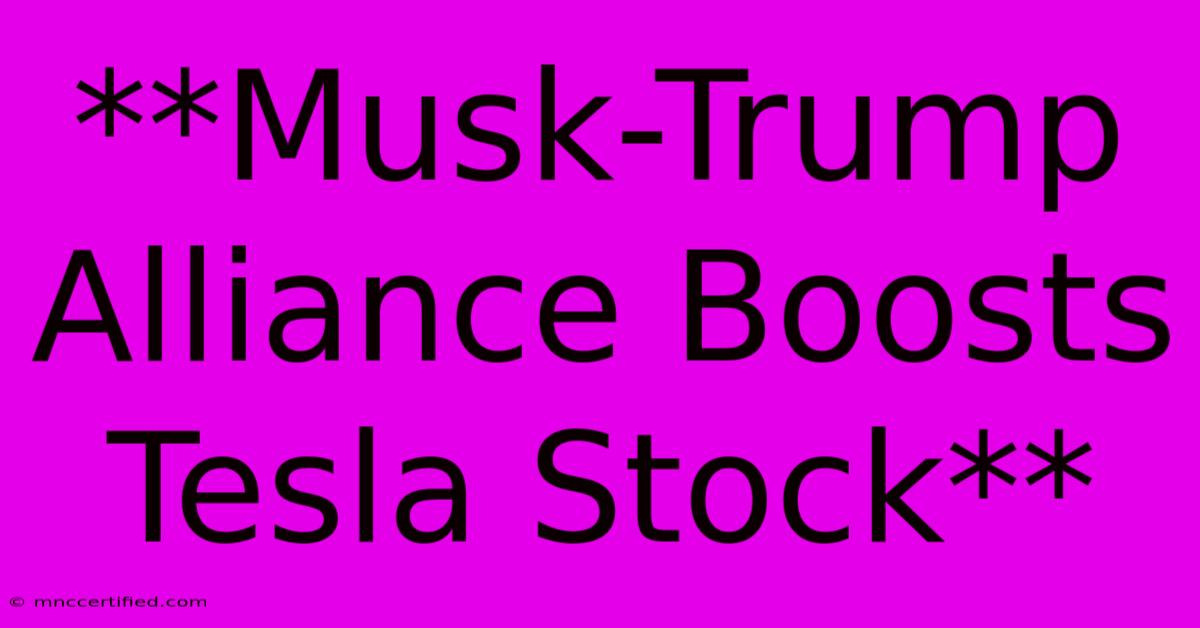**Musk-Trump Alliance Boosts Tesla Stock**

Table of Contents
Musk-Trump Alliance: Boon or Bust for Tesla?
The recent re-emergence of a potential alliance between Elon Musk and Donald Trump has sent shockwaves through the financial world, particularly within the realm of electric vehicles (EVs). While the political implications remain highly debated, the potential impact on Tesla's stock price is a topic that demands closer examination.
The Trump Factor:
Donald Trump's political stance on EVs has been notoriously inconsistent. While initially promoting their development, his administration later implemented policies that hampered the industry's growth, including tariffs on imported batteries and a rollback of EV tax credits.
However, Trump's apparent return to favor with Musk has rekindled speculation about a potential shift in his stance on EVs. This is fueled by Trump's recent statements advocating for American manufacturing, which aligns with Tesla's ambitions for domestic production expansion.
Musk's Motive:
Elon Musk's motivations for courting Trump remain unclear. Some analysts believe that he seeks to leverage Trump's influence to gain regulatory advantages and secure government contracts, particularly for Tesla's ambitious Starship program. Others argue that Musk is simply aiming for greater political influence and a more business-friendly environment.
The Potential Impact on Tesla Stock:
The potential impact on Tesla's stock price is a double-edged sword. On the one hand, a Trump-backed push for domestic EV production could boost Tesla's sales and market share, leading to increased demand for its vehicles and a rise in stock value.
However, the political controversy surrounding the alliance could alienate certain investors and potentially damage Tesla's brand image, leading to a decline in stock price. Additionally, a Trump administration could potentially introduce policies that favor traditional car manufacturers over Tesla, undermining its long-term growth prospects.
Beyond the Alliance:
While the Musk-Trump alliance dominates headlines, it's crucial to consider the broader economic landscape and the EV market's evolution. Factors such as rising inflation, supply chain disruptions, and increased competition from established automakers will significantly impact Tesla's future success.
Conclusion:
The potential impact of a Musk-Trump alliance on Tesla's stock price remains highly speculative. While a favorable political environment could benefit Tesla, the potential for controversy and unforeseen policy changes introduces significant uncertainty.
Investors need to carefully weigh the risks and rewards associated with this developing situation before making any investment decisions. The future of Tesla, like the future of the EV market, is ultimately shaped by a complex interplay of political, economic, and technological forces.

Thank you for visiting our website wich cover about **Musk-Trump Alliance Boosts Tesla Stock**. We hope the information provided has been useful to you. Feel free to contact us if you have any questions or need further assistance. See you next time and dont miss to bookmark.
Featured Posts
-
Parsons On Cowboys Veterans Feels Bad
Nov 12, 2024
-
Yamal Lewandowski Injured Barcelona Faces Challenge
Nov 12, 2024
-
Narrow River Trading Company Pajamas
Nov 12, 2024
-
Who Is Tom Homan Ice Chief Returns
Nov 12, 2024
-
Wall Street Rises Bitcoin Follows Trend
Nov 12, 2024